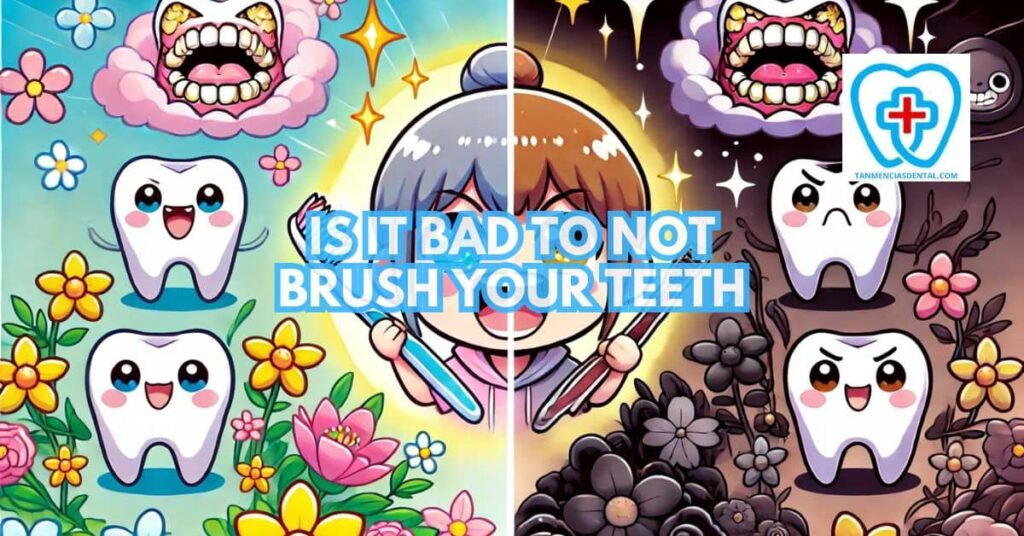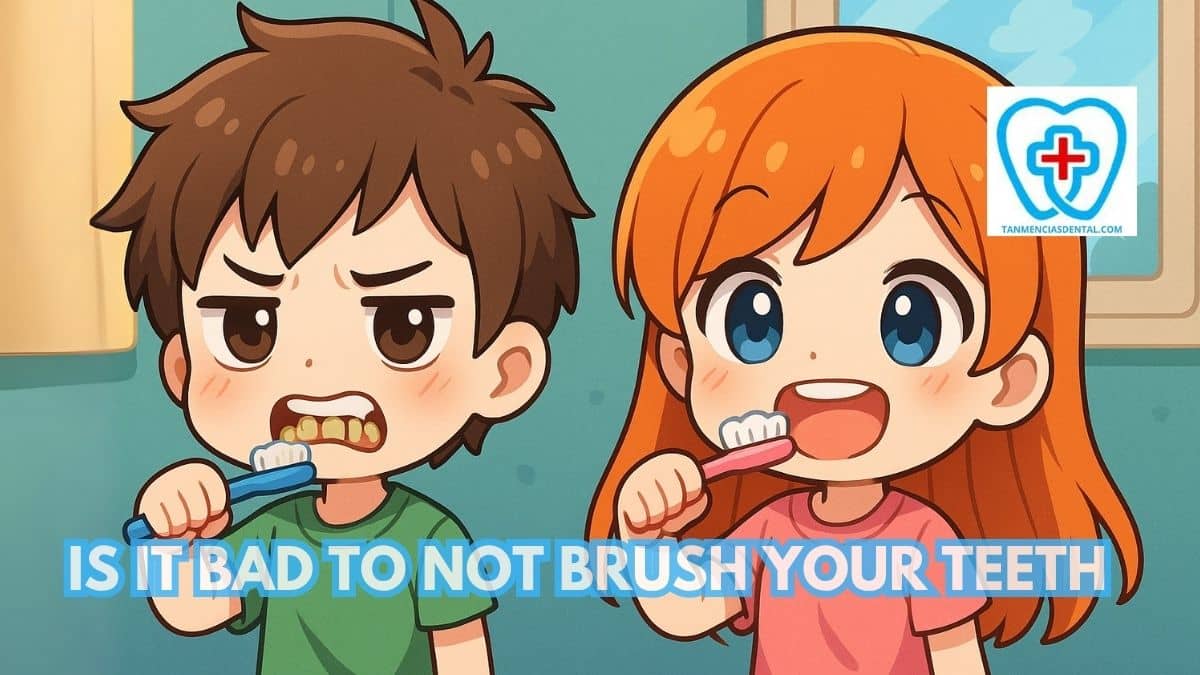Many people ask, Is it bad to not brush your teeth?
The short answer is yes, because skipping brushing can harm both your mouth and your overall health.
When you do not brush, bacteria and food stay on your teeth, which can cause cavities, gum disease, and bad breath.
Over time, these problems can lead to pain, high dental costs, and even affect how you feel about yourself.
Brushing your teeth every day is one of the easiest ways to stay healthy and feel good.
1. From Cavity Culprits to Tooth Decay: Why Brushing Fights Off Tooth Troubles
Plaque is a sticky film of bacteria that forms on your teeth every day.
When you don’t brush, this plaque can harden into tartar, which can only be removed by a dentist.
The bacteria in plaque produce acids that erode your tooth enamel, leading to cavities.
Brushing your teeth at least twice a day helps remove plaque and food particles, preventing these acids from causing damage to your teeth.
Regular brushing is crucial for protecting your teeth from decay and maintaining their strength.
🦷 What You Need to Know Before Choosing Affordable Veneers
2. Guarding Your Gums: How Brushing Prevents Gum Disease
Gum disease begins with plaque buildup along the gumline, leading to inflammation and bleeding.
This early stage, known as gingivitis, can progress to more severe periodontal disease if not addressed.
Brushing your teeth helps remove plaque from the gumline, reducing the risk of gum disease.
Consistent brushing also stimulates your gums, promoting better blood flow and overall gum health.
Preventing gum disease is crucial, as it can lead to tooth loss and other serious health issues.
🦷 Why Baby Hates Brushing Teeth and How to Win!
3. Kiss Bad Breath Goodbye: Brushing for Freshness
Bad breath, also called halitosis, is often caused by bacteria in your mouth that release smelly sulfur compounds.
These bacteria grow on leftover food and in places your toothbrush might miss if you do not brush well.
Brushing your teeth at least twice a day helps remove bacteria and bits of food that can lead to bad breath.
Using a toothbrush with soft bristles and toothpaste that contains fluoride and antibacterial ingredients makes brushing more effective.
It is also important to brush your tongue, where many odor-causing bacteria live.
Along with brushing, flossing, and using mouthwash can help clean areas between teeth and keep your breath fresh longer.
Visiting your dentist regularly ensures that any deeper problems, like gum disease or tooth decay, are treated early before they cause ongoing bad breath.
🦷 How to Make Brushing Your Teeth Fun
4. Brushing for a Brighter Smile: Keeping Stains at Bay
Every day, the foods and drinks we consume can leave stains on our teeth.
Coffee, tea, red wine, and certain foods are known culprits that can discolor your teeth over time.
Brushing your teeth regularly helps to remove these surface stains before they set in.
Using whitening toothpaste can further help maintain a bright smile.
Consistent brushing is key to preventing discoloration and keeping your teeth looking their best.
🦷 Is It Okay To Drink Water After Brushing Your Teeth?

5. Beyond Your Mouth: The Link Between Brushing and Overall Health
Oral health is closely connected to overall health, and neglecting your teeth can lead to broader health issues.
Bacteria from untreated gum disease can enter the bloodstream and contribute to conditions like heart disease and diabetes.
Regular brushing helps to keep harmful bacteria in check, reducing the risk of these serious health problems.
Maintaining good oral hygiene is not only about protecting your teeth but also about safeguarding your general health.
Brushing twice a day is a simple yet effective way to promote overall well-being.
🦷 Can Tooth Decay Be Transmitted by Kissing?
6. Confidence Starts with a Smile: How Brushing Boosts Self-Esteem
A clean and bright smile can significantly enhance your confidence.
When you brush regularly, your teeth stay clean and free of plaque, making you feel more comfortable and self-assured when you smile.
Good oral hygiene also ensures fresh breath, which is crucial for social interactions.
By maintaining your smile, you can approach social and professional situations with greater confidence.
Brushing your teeth is an easy way to boost your self-esteem and make a positive impression.
🦷 How Often Can You Brush Your Teeth With Activated Charcoal?
7. How Poor Oral Hygiene Can Affect Your Social Life and Mental Health
Poor oral hygiene not only harms teeth and gums, but it can also affect how people feel about themselves and interact with others.
Chronic bad breath or noticeable tooth decay might cause embarrassment, making someone less willing to speak or smile around others.
Missing or damaged teeth can cause feelings of shame or anxiety, possibly leading to isolation or fewer friendships.
Being self-conscious about oral health issues can even stop people from taking part in group activities or speaking up in school or at work.
Regular brushing can prevent these emotional and social challenges by keeping your mouth healthy and your smile confident.
🦷 How Do Dentists Treat Cavities?
8. Preventing Painful Problems: Brushing to Avoid Toothaches and Abscesses
Skipping brushing can lead to the buildup of plaque and bacteria, which can cause toothaches and painful abscesses.
These conditions often require extensive dental treatments such as fillings, root canals, or extractions.
Regular brushing helps to remove plaque and prevent cavities, thereby reducing the risk of toothaches and abscesses.
By keeping your teeth clean, you can avoid the discomfort and inconvenience of dental pain.
Consistent brushing is a proactive way to protect your oral health and prevent painful problems.
🦷 Why Whitening Trays Are Preferred Over Other Teeth Whitening Methods
9. Save Money with a Simple Step: Brushing to Avoid Costly Dental Procedures
Neglecting to brush your teeth can lead to expensive dental treatments down the line.
Cavities, gum disease, and other oral health issues often require professional interventions like fillings, crowns, and root canals.
These procedures can be costly and time-consuming.
By brushing your teeth regularly, you can prevent these problems and save money on dental bills.
Investing a few minutes each day in brushing can lead to significant savings in the future.
🦷 Why Should Parents Choose a Specialized Dentist for Kids Over a General Dentist?
10. Building Healthy Habits for Life: Brushing as the Foundation of Good Hygiene
Developing a routine of brushing your teeth twice a day sets the foundation for overall good hygiene.
This habit, established early in life, encourages a lifetime of healthy practices.
Consistent brushing helps reinforce the importance of self-care and personal responsibility.
Teaching children to brush regularly can instill good habits that they will carry into adulthood.
Good oral hygiene is a cornerstone of a healthy lifestyle, and brushing is where it all begins.
🦷 How Dentistry For Kids Differs From Adult Dental Care
11. A Simple Solution for Big Benefits: Why Brushing is Your Best Defense
Brushing your teeth is a simple daily task that yields substantial benefits for your oral and overall health.
It helps remove food particles, plaque, and bacteria that can lead to cavities, gum disease, and bad breath.
Regular brushing also supports a brighter smile and fresh breath, boosting your confidence.
This easy and quick routine is your best defense against numerous dental problems.
Embracing the habit of brushing ensures a healthy mouth and a happier you.
🦷 Comprehensive Dental Services in Marikina City
👨⚕️ Conclusion
The consequences of not brushing your teeth extend far beyond just oral health.
From cavities and gum disease to bad breath and costly dental procedures, the risks are significant.
Poor oral hygiene can also affect your overall health, leading to more serious conditions.
By committing to regular brushing, you can prevent these issues and maintain a healthy mouth.
Remember, a small daily effort can have a big impact on your health and well-being.
😊 Self-Promotion
Visit Tan-Mencias Dental Clinic in Parang, Marikina City, where your smile is our top priority.
Our friendly and professional team is here to provide you with the best dental care in a comfortable and welcoming environment.
For any questions or concerns, feel free to call us at 9171451074, leave a message on our Facebook page, or contact us through our website.
We’re always ready to help you achieve and maintain a healthy, beautiful smile.
Come and experience the exceptional care at Tan-Mencias Dental Clinic today!

